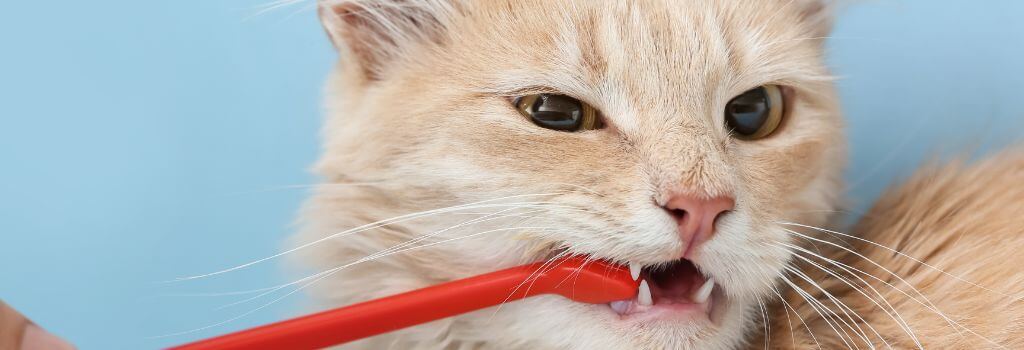A pet’s heart is the engine that keeps them moving every day and full of life. A strong, healthy heart supports a pet’s active lifestyle, helps maintain proper circulation, and contributes to more years with you! But just like humans, pets can develop heart conditions that may go unnoticed until they become serious. Fortunately, there are a number of proactive steps you can take to support your pet’s heart health, from feeding a balanced diet to ensuring they get the right amount of exercise and veterinary care. Read on for tips I often share with pet owners who want to love their pet’s heart and keep it as strong and healthy as possible.
Nutrition & Diet
A balanced diet is one of the most important things a pet owner can provide their pet with to take care of their heart health. When veterinarians tell you to feed your dog or a cat a balanced diet, they mean that you should be providing your pet with nutrition that includes appropriate levels of protein, fat, carbohydrates, vitamins, minerals, amino acids, and, of course, water. Commercially formulated, Association of American Feed Control Officials (AAFCO)-approved diets are great options for helping your pet get all of the nutrients they need for healthy heart function in the right quantities.
When it comes to selecting a diet for dogs, some pet parents may fall victim to unfounded claims about grain-free diets being the best choice for nutrition. However, while grain-free diets can be adequate options – or even medically necessary – for pets with allergies, there is no evidence that they are superior to diets that include grain. In fact, recent studies have found connections between grain-free diets and dilated cardiomyopathy (DCM) in pets. Unless specifically directed by your veterinarian, pet owners should avoid feeding their pets grain-free diets and stick to foods and formulations that are regulated and backed by veterinary science.
But what about treats? Treats are a great training incentive for both cats and dogs and, let’s be honest; sometimes, it’s just fun to spoil your pet with a few of them! Veterinarian-approved treats certainly do have a place in a pet’s balanced diet, but they need to be given in moderation. It is generally recommended that treats make up less than 10% of an animal’s daily caloric intake in order to prevent overeating and unnecessary weight gain.
The Importance of Taurine
Vitamins, minerals, and amino acids are important components of an animal’s diet, and sometimes deficiencies in these key nutritional elements can lead to negative health effects. When it comes to pet cardiology, taurine is one of the most talked about amino acids. Cats who are taurine deficient become at risk for DCM, a serious heart condition that occurs when the heart muscle weakens to a point where the heart can no longer pump blood effectively.
Taurine is exclusively found in animal-based proteins, and because cats cannot synthesize enough taurine on their own, they rely on diets that include meat to meet their taurine needs for healthy heart function. The heart isn’t the only organ that can be affected, however. Without enough taurine, retinal cells in a cat’s eye can begin to degenerate, leading to a condition called feline central retinal degeneration (FCRD). To avoid taurine deficiencies, veterinarians recommend feeding cats a commercial diet that includes adequate meat or animal-based protein sources.
Those grain-free diets we discussed previously can also be a major contributor to taurine deficiencies, so if you have any questions, concerns, or doubts about your pet’s diet and nutritional intake, don’t hesitate to get in touch with your veterinarian. They can help you create a diet plan tailored to your pet’s individual needs.

Exercise & Weight Management
Keeping pets active and appropriately exercising them based on their energy expenditure needs and age is a great way to keep them in shape and contribute to better heart health and function. While some athletic breeds, like Border Collies, German Shepherds, Australian Shepherds, and Greyhounds, among others, will need extra exercise, it is recommended that most dogs get between 30 minutes to 2 hours of exercise each day, either through training, playing, walking, or a combination of the three.
Cats should also be given similar exercise considerations in order to keep their hearts strong and healthy. Cats will typically need a little less exercise than most dog breeds due to their smaller size; however, in order to promote good heart health, it is recommended that cats get at least 20-30 minutes of moderate exercise each day. This can be achieved through playing with interactive toys, like laser pointers and wand toys, chasing small objects or toys, walking on a leash with their owner, or even climbing structures like cat trees.
Preventing Obesity
But exercise isn’t just for fun; it’s also a crucial part of preventing obesity in pets, which is a large contributor to the development of cardiac issues. The Association for Pet Obesity Prevention found in a 2022 study that 59% of dogs and 61% of cats in the United States were considered overweight or obese. Obese dogs and cats have been found to be more likely to develop heart problems due to complications of obesity, like high blood pressure, malformation in the heart’s structure, and impaired heart function. This occurs due to the extra strain the heart is placed under when a pet is carrying multiple pounds of extra body fat.
Obesity in pets can also lead to a host of other health problems, like diabetes, joint pain, respiratory complications, and kidney disease among others. So exercise is not just important for a healthy heart, but an overall healthy pet!
If your pet already has a heart condition, you’ll need to take a little extra care when exercising in order to ensure that your pet doesn’t overdo it and worsen their condition. Many pets with heart conditions have also been found to be sensitive to high temperature, so you may want to reconsider exercise if the temperatures are high or it’s an exceptionally warm day compared to what your pet is used to.
Because many heart diseases that affect pets can not be cured, only managed, the goal of exercise in affected pets is to allow them to enjoy themselves and maintain mobility without putting any extra and unnecessary stress on their heart. So be sure to keep a close eye on your pet’s body language, and don’t be afraid to call it a day if they seem to be getting tired.
Routine Veterinary Care
Regular veterinary visits are essential for monitoring your pet’s heart health and getting ahead of any cardiac issues before they progress. Many of the heart conditions that affect cats and dogs are ones that develop gradually, and oftentimes, these conditions have already become detrimental before owners can even realize something isn’t quite right with their pet.
When you keep up with your pet’s annual wellness visits, you’re allowing your veterinarian to make sure your pet’s heart is in tip-top shape year after year. If an issue does arise during an annual exam, it will have only had a short amount of time to progress since your last visit, leading to better treatment outcomes and management of the disease. During a routine wellness visit, your veterinarian will:
- Listen to your pet’s heart using a stethoscope (auscultation) to check for murmurs or abnormal rhythms.
- Assess breathing patterns to identify any signs of fluid buildup in the lungs.
- Check for physical signs such as weight changes, lethargy, or swelling in the abdomen.
- Discuss any observed symptoms like coughing, exercise intolerance, or fainting episodes.
How Other Health Factors Impact Heart Health
While diet, exercise, and regular veterinary care are the recommendations most veterinarians start with when educating pet owners on how to care for their pet’s heart health, there are a number of other health factors that can affect a dog or cat’s heart.

Dental Health
Much like in humans, dental health for pets is incredibly important, as dental diseases can contribute to the development of other health issues that can affect numerous parts of the body – heart disease included.
Dental disease increases the risk of circulating bacteria, which can affect the heart. More specific dental diseases, like periodontal disease, contribute to cardiovascular disease in humans, and studies are finding similar correlations in dogs and cats.
Brushing your pet’s teeth regularly and getting professional dental cleanings done is an easy way to not only protect their smile, but also keep protected from bacteria and other elements that can contribute to heart disease.
Parasite Prevention
An often overlooked aspect of caring for a pet’s heart health is parasite prevention. When pet owners think of parasite prevention their mind typically jumps to warding off fleas and ticks, but other parasites, like heartworms can pose a major threat to an animal’s heart function.
Heartworms physically block the flow of blood in an animal’s pulmonary arteries. This blockage causes the heart’s right ventricle to work harder than it needs to, oftentimes leading to heart failure. Heartworms' presence can also be felt beyond an animal’s heart, and their presence in your pet’s body can wreak havoc on its lungs, liver, and kidneys.
Unfortunately, in some cases, heartworm can be fatal. But the good news is that it’s very easy to prevent, and heartworm preventatives are exceptionally effective when sussed correctly. There are a number of FDA-approved heartworm preventatives that are easily accessible to all pet owners. Your veterinarian can recommend which formulation or type of preventative would be the best for your dog or cat.
Environmental Factors
As responsible pet owners, we all try to give our pets the safest and most comfortable environment to live in. However, despite our best efforts, certain aspects of our homes and yards can negatively impact our pet’s health – and these are often easily overlooked by owners. When pet proofing your home or thinking of ways to make your home better suited to your pet, don’t ignore the impacts that smoke, chemicals, and even plants can have on your pet and their heart health.
Smoke Exposure and Its Effect on Pets
Just like in humans, exposure to cigarette smoke, wildfire smoke, and other air pollutants can have harmful effects on a pet’s cardiovascular and respiratory health.
- Secondhand smoke has been linked to an increased risk of heart disease in pets.
- Smoke inhalation can lead to reduced oxygen levels in the blood, increased inflammation, and long-term damage to heart and lung function.
- Pets with pre-existing heart disease are especially vulnerable to complications from poor air quality.
Toxic Plants That Can Harm the Heart
Certain plants contain toxins that can affect heart function if ingested by pets. One of the most dangerous examples is oleander, a common ornamental shrub.
- Oleander contains cardiac glycosides, which can cause severe heart arrhythmias, vomiting, and even death in pets.
- Foxglove, lily of the valley, and rhododendrons also contain compounds that can negatively impact the heart.
- Yew plants are highly toxic and can cause sudden cardiac failure if consumed.
Loving Your Pet’s Heart for a Long, Healthy Life
Caring for your pet’s heart is an essential part of ensuring they live a long, happy, and active life. But keeping your pet’s heart healthy isn’t a burden you need to bear alone. Your veterinarian is your best resource for information on keeping your pet as healthy as possible and addressing any health issues – heart included – that may develop throughout their lifetime. Together, you and your veterinarian can make a big difference in preventing heart disease and keeping your dog or cat around for longer.
If you have questions and you'd like to reach out to us, you can call us directly at (480) 613-9277, or you can email us at info@urgentvetcc.com. Don't forget to follow us on social media Facebook, Instagram.

